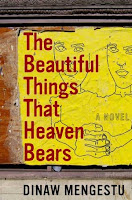I love list. And no, I'm not just looking at things and saying I love them. Lists make my life possible: grocery lists, To Get Done lists, I Do lists (what I call my wedding to do list), contact lists, and, of course, book lists. With the end of the year always comes a deluge of "best of" lists, and none are more enticing to me than the best books lists. It is a special sort of joy to read through a list of books that come highly recommended that you haven't already read so that you can, naturally, put them on your To Read list. I've collected here some of the Best Books of 2013 lists that I appreciate for one reason or another:
Riot Round-Up: The Best Books of 2013
Self-described as a list "as eclectic and indiosyncratic" as the Book Riot bloggers are, this list has a few books I just can't wait to read, and many more I hadn't even heard of this year. Who doesn't like hearing about new books?
The Overlooked Books of 2013 (Slate)
If you're interested in what Slate editors consider to be the books from 2013 that you haven't heard about but should have, then here you go.
Independents' View of 2013's Best Books (The Guardian)
We can't forget about our friends across the pond, and independent bookstores throughout the United Kingdom provided The Guardian with their picks for books of the year.
Favorite 2013 Books of 50 Famous People (The Wall Street Journal)
I'm always intrigued by what famous people are reading--and in this case, who The Wall Street Journal thinks of as famous and noteworthy. There are some pretty interesting picks on this list.
River City Reading's Best Books (and Blogger Voices) of 2013
I appreciate this list because it features 10 books that are the compiler's favorites of the year along with the thoughts of her favorite reviewers and bloggers.
Happy reading in 2014!
This year, NPR decided to forego a list and has created an innovative, interactive site of tiled book covers that you can adapt to your reading preferences. I'm quite smitten with this design.
Luckily, it seems like every year more and more contemporary fiction books get translated. This list is a real resource, in my opinion. Scroll to the very bottom to see WLT editors' picks for best translations of the year.
Riot Round-Up: The Best Books of 2013
Self-described as a list "as eclectic and indiosyncratic" as the Book Riot bloggers are, this list has a few books I just can't wait to read, and many more I hadn't even heard of this year. Who doesn't like hearing about new books?
The Overlooked Books of 2013 (Slate)
If you're interested in what Slate editors consider to be the books from 2013 that you haven't heard about but should have, then here you go.
Independents' View of 2013's Best Books (The Guardian)
We can't forget about our friends across the pond, and independent bookstores throughout the United Kingdom provided The Guardian with their picks for books of the year.
Favorite 2013 Books of 50 Famous People (The Wall Street Journal)
I'm always intrigued by what famous people are reading--and in this case, who The Wall Street Journal thinks of as famous and noteworthy. There are some pretty interesting picks on this list.
River City Reading's Best Books (and Blogger Voices) of 2013
I appreciate this list because it features 10 books that are the compiler's favorites of the year along with the thoughts of her favorite reviewers and bloggers.
This list is on the lengthy side, including 50 non-fiction and 50 fiction titles, and has enough suggestions to perhaps keep you reading until the next decade.
If 100 is too many titles to digest, NYT narrowed their list of 100 notable titles down to their picks for the 10 best books of the year.
Okay, so technically this award was given in early 2013 to great 2012 books, and you'll have to stay tuned for the 2014 award nominees for the best of 2013 books (thus its position on the list). The webpage provides numerous great titles from the previous year from Powell's Books readers. Also, how cute is the name Puddly Awards?











